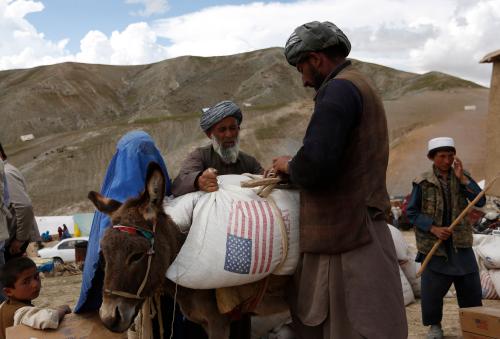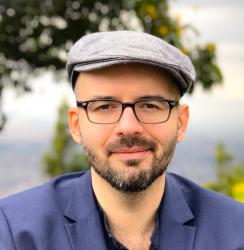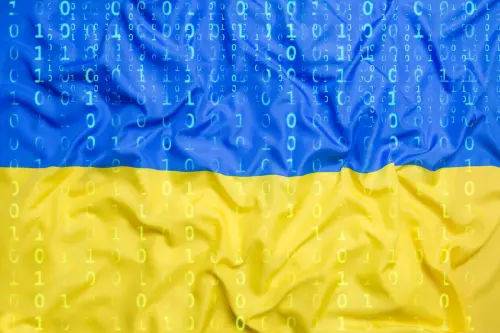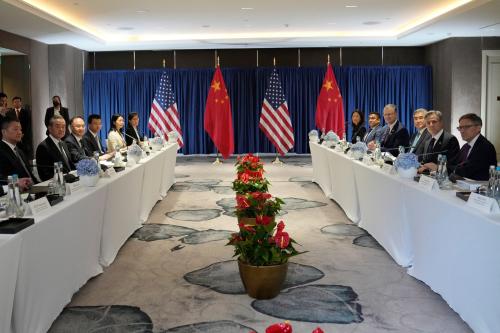One of the first things that visitors see when entering the World Bank headquarters in Washington, D.C., is a small plaque proclaiming a grand aspiration: “Our dream is a world free of poverty.” Over time, this mantra has become associated with projects ranging from building dams and highways, to creating jobs and spurring private sector growth. But in a world where 2 billion people continue to live in countries affected by fragility, conflict, and violence, will the next generation of development finance support police and armies to keep the peace? In many ways, the answer could be yes.
The intellectual groundwork for this potential shift has been laid over the past decade. Two World Development Reports tackled the security-development nexus. The WDR 2011 explicitly argued that investments in citizen security and justice reform can help countries break recurring cycles of violence. The WDR 2017 surmised that good governance reduces incentives for violent behavior though channels such as effective deterrence, equitable distribution of resources, and legitimate dispute resolution. Meanwhile, the United Nations and World Bank have also published two reports that bring together expertise in security and development: a methodology on how to analyze public spending of defense and justice institutions in fragile states and a flagship study on prevention of violent conflict.
An emerging conclusion from these studies is that security actors can benefit from development interventions, which boost their performance, ensure greater accountability, and financial solvency. Consider the case of Nigeria, where the fight against the insurgent group Boko Haram has forced the government to redeploy soldiers for policing purposes and buy $1 billion worth of weapons. Development interventions could assess if this expenditure is sustainable over the long run and how it will affect other sectors like education and health. Technical assistance (and perhaps direct budget support) could ensure that, when new police are recruited to make up for the current shortage of personnel, salaries and operating expenses are paid on time. Once hostilities with Boko Haram cease, development finance informed by adequate political and reputational risk assessments could support disarmament, demobilization, and reintegration (DDR) projects to ensure the transition of select former combatants to civilian life. A rough estimate of World Bank investments in DDR over the past 20 years comes to $1 billion for projects dedicated to skills development and psychosocial support for former combatants.
This approach to the security-development nexus is stylized in Figure 1 (below). Economic analysis, technical assistance, and direct budget support could assist police and militaries in providing reliable security service delivery, as well as help non-state security actors transition to civilian life. In turn, professional armies, greater public safety, and trust in state institutions to effectively monopolize violence can make the space for service delivery and poverty reduction, especially in areas that were previously inaccessible to development professionals.
Figure 1: The security-development nexus
To some extent, donors have already began experimenting with different methods. In 2010, the Cotonou Agreement outlining the framework for development cooperation between the European Union and 79 countries in Africa, the Caribbean, and Pacific was revised to highlight the interdependence between security and development. Recognizing the potential contribution that more effective and professional armies can improve governance, the EU is engaged in enhanced cooperation with armed forces under the African Peace Facility, which is financed through the European Development Fund with an envelope of about $600 million for 2017-2018. Moreover, the Organization for Economic Cooperation and Development’s Development Assistance Committee now includes certain security-related expenditures such as security sector management and civilian peacebuilding as eligible for official development assistance.
The world can be free of poverty only if it is secure. While this next generation of development finance may take some years to manifest at a global scale, one way of starting is to ensure principles of development aid apply to bilateral security sector assistance. In the security world, there is currently no equivalent of the Busan Partnership for Development Cooperation. With conflicts raging from the Sahel to Syria, the time for this shift has come.







Commentary
Development for security: Lending for peace?
April 20, 2018